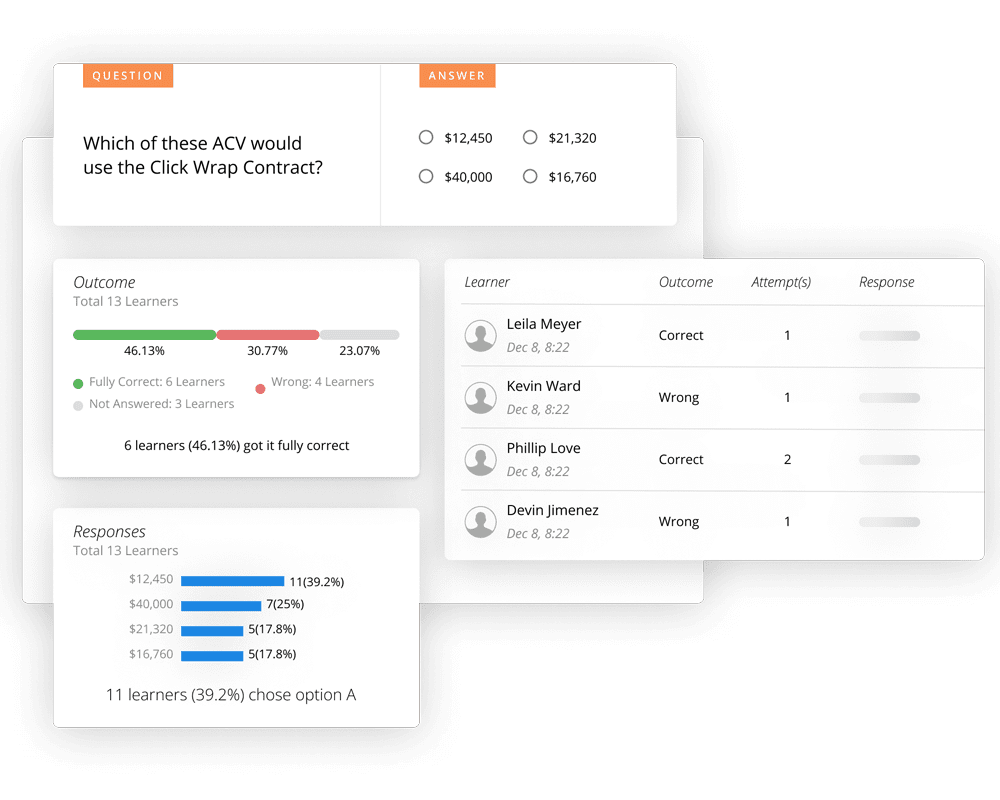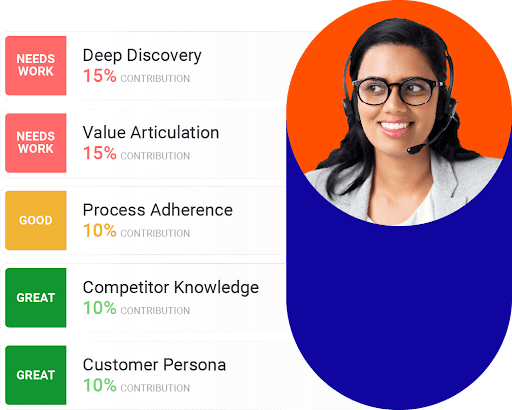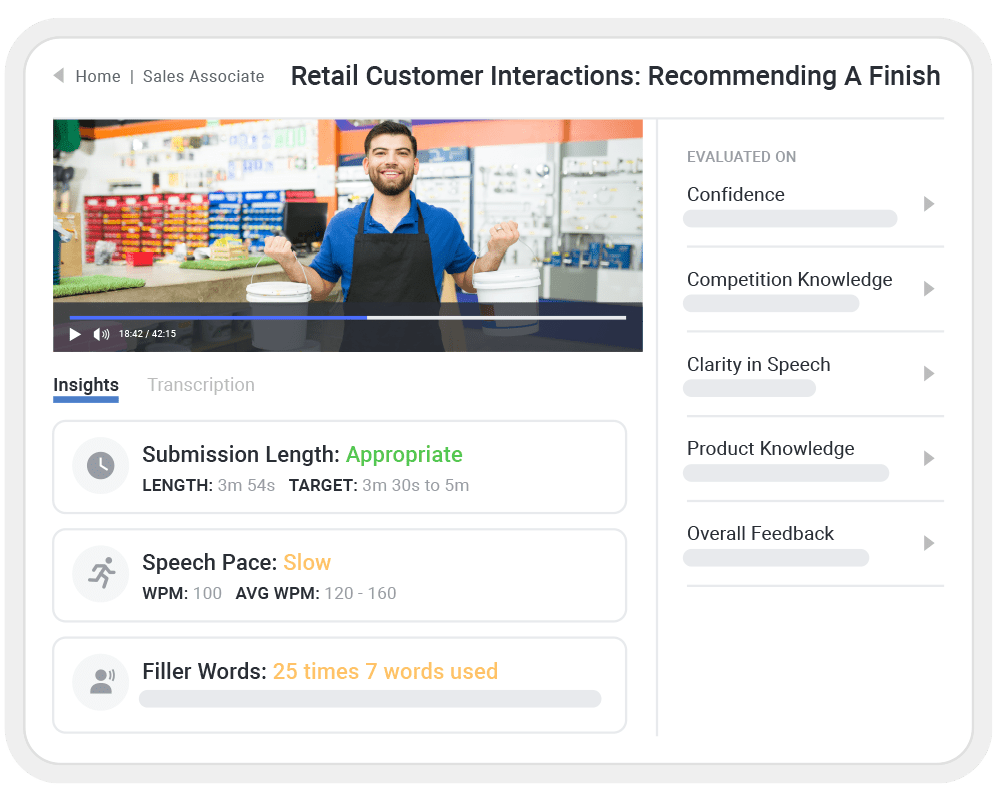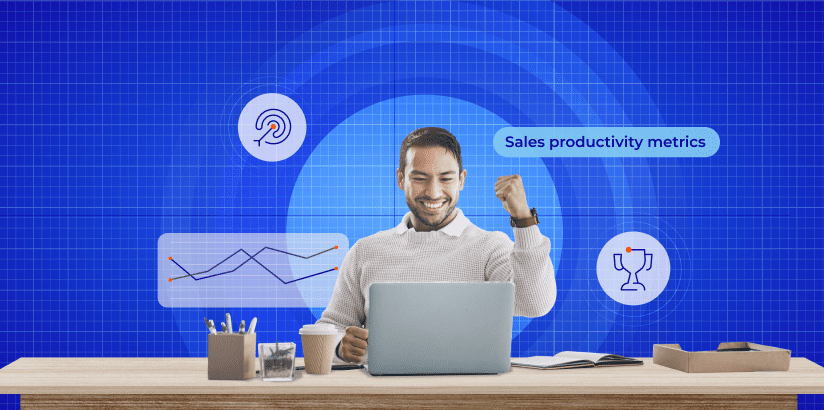Every member of the sales team is unique. Each seller has a different experience, strengths, weaknesses, and learning styles that work best for them.
Blanketing every single seller with the same sales training and learning doesn’t make sense. Instead, winning organizations take an individualized learning approach.
Individualized learning might sound like a great concept in theory. But actually creating and delivering it for every member of the sales team can seem impossible—especially for enterprises with hundreds or even thousands of sales reps.
With the right strategy and tools, it doesn’t have to be.
Read on to explore individualized learning, why it’s a winning approach for revenue organizations, and how you can start creating and delivering learning that will create an entire team of top performers.
What is individualized learning?
First things first: what is it?
As the name suggests, individualized learning (also referred to as personalized learning) is learning tailored to each individual’s needs. It’s the opposite of a traditional approach to learning, where the same generic learning is distributed to everyone in a particular group, regardless of its relevance.
In sales, individual learning involves creating and delivering learning customized to each seller’s needs.
An individualized learning approach considers each sales rep’s strengths and weaknesses within the revenue organization. Then, sellers receive personalized learning paths to improve their weaker skills and job performance.
For example, let’s say a seller struggles with objection handling. That seller would receive targeted learning opportunities to help them strengthen this key skill. However, other sales reps who have mastered objection handling wouldn’t be required to complete this training.
Individualized learning also considers individuals’ learning preferences. For example, some sales reps may learn well by reading written training materials, while others learn better via video.
Learners are in the driver’s seat when an organization uses this approach. They can access the right learning opportunities to close skill gaps and improve performance – whenever and wherever needed.
Why is individualized learning important?
Investing in employee learning is a good move for any revenue organization. When revenue teams have access to the right training and learning opportunities, they’re better equipped to do their jobs well, which can have a big bottom-line impact.
But generic learning programs won’t drive these results. Instead, the most successful revenue organizations adopt an individualized learning approach.
Let’s explore some of the top advantages.
Tailored learning that helps each seller hone key skills
Organizations often blanket sales training programs across the entire revenue organization. That means some (or even many) of your sellers waste their time on irrelevant training.
A key advantage of an individualized learning approach is that each seller has access to relevant learning opportunities. This tailored learning will help sellers strengthen the skills they need for success.
Personalized coaching that improves long-term success
Recent research found that top sellers receive significantly more coaching than their lower-performing peers. Coaching is tied to better performance.
But delivering one-size-fits-all sales coaching or focusing solely on deal coaching won’t make much of a long-term impact.
When organizations adopt an individualized learning approach, sales managers gain insight into each rep’s strengths and weaknesses. They can then provide tailored coaching to improve sellers’ skills and performance in the field.
Timely learning opportunities that address needs as they arise
Often, organizations assign training on a schedule. For example, a sales rep might be required to complete training every 90 days – regardless of whether they need it.
With individualized learning, training is available when the need arises. That way, the seller can complete the training when it’s most relevant. For example, if a sales rep struggles with discovery, they’ll be assigned training immediately to close this skill gap.
Learning that’s accessible on-demand from any device
Previously, sales training programs would be delivered at a specific time. If a seller had a conflict, they’d miss the learning opportunity.
With individual learning, sellers can complete relevant training and learning opportunities anytime, from any device.
Greater seller engagement
If sellers are required to complete generic, irrelevant training, they will likely disengage. But with personalized learning, sales reps get tailored learning opportunities. Relevant learning opportunities are more likely to engage sellers, and when sellers are engaged, they’re more likely to retain what they’ve learned.
A data-based approach to learning
In the past, organizations delivered sales training programs and other learning opportunities they hoped would be effective without the data to back their decisions.
On the other hand, individualized learning is rooted in data.
First, organizations leverage data to understand their sellers’ strengths and weaknesses. Then, these orgs work to deliver relevant learning opportunities to strengthen sellers’ weaknesses. Organizations with an individualized learning mindset also measure the impact of training on performance and adjust as needed.

How to create individualized sales training and sales coaching programs
Taking an individualized learning approach makes sense. When you deliver personalized learning to your revenue teams, every member has what they need to improve the skills and behaviors that matter most.
But how do you create an individualized learning program at your organization? Let’s examine some best practices.
#1 Define what excellence looks like for each customer-facing role
All revenue leaders want a team of great sellers. But often, they don’t take the time to define what great looks like.
A foundational component of individualized learning is defining what excellence looks like at your organization.
Make a list of all revenue roles within your organization. Then, create an ideal rep profile (or IRP for short) that defines the key skills and behaviors necessary for success in each role.

An integrated revenue enablement platform like Mindtickle enables you to create IRPs for each key role within the platform.
#2 Develop sales training and sales coaching programs to address key skills
Once you’ve determined the skills and behaviors your sellers need for success, you must have training and coaching programs to help them build these key competencies.
Do an audit of your existing sales training programs and content to identify gaps. Then, you can develop new sales training to fill in those gaps. Artificial intelligence can make it faster to develop and launch learning programs.
Be sure to incorporate different types of learning into your programs. In addition to longer format training, consider elements like bite-sized reinforcement videos, quizzes, and interactive role-play opportunities.

#3 Measure each sales rep against the appropriate IRP
Individualized learning that addresses the strengths and weaknesses of each sales rep is extremely effective. Yet, a recent report found only 40% of C-level executives say they can identify a rep’s strengths and weaknesses for customized training.
Research shows that only
Once you’ve developed your IRPs, measure each sales rep against them regularly. That way, you’ll understand where reps excel and where they need extra help. These insights can fuel your learning initiatives.
This can be difficult to track manually. However, some revenue enablement platforms allow you to quickly and easily determine how each sales rep performs against the appropriate IRP.
#4 Deliver relevant, individualized learning to each rep
Once you’ve identified each rep’s strengths and weaknesses, you can deliver individualized learning to close the gaps.
Determining which training is relevant to which rep can be tricky (and time-consuming). However, a revenue enablement platform like Mindtickle considers each rep’s strengths and weaknesses and then identifies personalized programs for every member of the revenue team.
#5 Equip managers with the proper tools and training
Sales coaching is a key component of any individualized learning plan. But not all sales coaching is effective.
Be sure to equip your sales managers with the tools to deliver personalized coaching at scale. The right tools will empower sales managers to quickly identify their reps’ strengths and weaknesses, which can inform personalized coaching.
It’s also important to train sales managers to be effective coaches. Be sure to take an individualized learning approach. While some managers are great sales coaches, others need additional training and coaching.
#6 Measure individualized learning impact
Your sellers may engage with your individualized learning programs. But that doesn’t necessarily mean they’re effective.
It’s important to determine whether your programs are actually making an impact. You must track the right metrics to determine whether your individualized learning initiatives are actually improving reps’ skills and behaviors and empowering them to close more deals.
Then, you can make adjustments as necessary to improve outcomes.
#7 Look for opportunities to automate with AI
Individualized learning is key to creating an entire team of top performers. But creating and delivering plans across the revenue organization requires much time and effort.
Winning organizations leverage artificial intelligence (AI) to deliver personalized learning at scale.
For example, some revenue organizations leverage AI to suggest learning opportunities to reps based on their strengths, weaknesses, and behaviors. Others use AI to build individualized learning programs quickly. Still others leverage AI to provide their sales reps with dynamic, interactive opportunities to practice their skills.
Your learning management system (LMS) or revenue enablement platform may have capabilities that enable you to deliver learning at scale. Be sure to ask your vendors.
#8 Invest in the right technology
A successful approach requires the right tools and technology. You must have the right tools and technology to execute the best practices we’ve explored in this guide.
Today, some organizations depend on a learning management system (LMS) to power their programs. But many are outgrowing their LMS and looking for a more robust solution, like an integrated revenue enablement platform.
Create and deliver personalized learning programs with Mindtickle
Today, the most successful organizations are consolidating their sales learning stack and trading their LMS for an integrated revenue enablement program like Mindtickle.
With Mindtickle, you can quickly develop and deploy sales learning programs that help your sellers master the most important skills. Sellers can access all individualized learning – including onboarding, training, coaching, and content – all in one platform.
With Mindtickle, you can create Ideal Rep Profiles to define the skills and competencies each customer-facing role needs for success. Then, you can measure your reps against the IRP to pinpoint their strengths and weaknesses. Once you’ve unlocked these insights, you can deliver individualized learning, training, enablement, and coaching to help reps strengthen their skills and improve behaviors. Mindtickle also makes it easy to measure the impact of your programs on sales productivity and performance.
Individualized Learning with Mindtickle
Ready to see how Mindtickle empowers revenue organizations to develop and deliver individualized learning programs at scale?
Get Your Demo


 By Rahul Mathew
By Rahul Mathew

